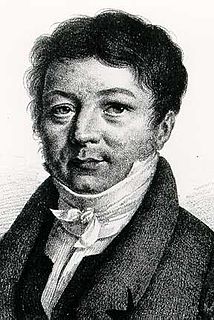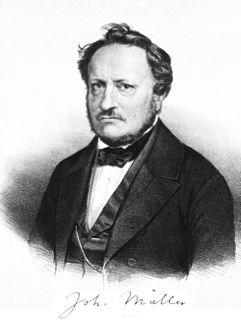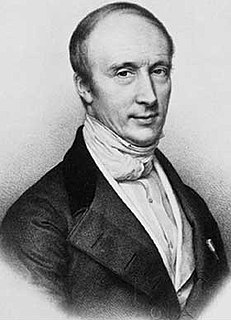A Quote by Francois Magendie
I know that certain minds would regard as audacious the idea of relating the laws which preside over the play of our organs to those laws which govern inanimate bodies; but, although novel, this truth is none the less incontestable. To hold that the phenomena of life are entirely distinct from the general phenomena of nature is to commit a grave error, it is to oppose the continued progress of science.
Related Quotes
The laws of thermodynamics may be regarded as particular cases of more general laws, applicable to all such states of matter as constitute Energy , or the capacity to perform work, which more general laws form the basis of the science of energetics, a science comprehending, as special branches, the theories of motion, heat, light , electricity , and all other physical phenomena.
First, it is necessary to study the facts, to multiply the number of observations, and then later to search for formulas that connect them so as thus to discern the particular laws governing a certain class of phenomena. In general, it is not until after these particular laws have been established that one can expect to discover and articulate the more general laws that complete theories by bringing a multitude of apparently very diverse phenomena together under a single governing principle.
The mathematical thermology created by Fourier may tempt us to hope that, as he has estimated the temperature of the space in which we move, me may in time ascertain the mean temperature of the heavenly bodies: but I regard this order of facts as for ever excluded from our recognition. We can never learn their internal constitution, nor, in regard to some of them, how heat is absorbed by their atmosphere. We may therefore define Astronomy as the science by which we discover the laws of the geometrical and mechanical phenomena presented by the heavenly bodies.
I can have little patience with those who oppose ... the theory of evolution or what are called "mechanistic" explanations of the phenomena of life because of certain moral consequences which at first seem to follow from these theories, and still less with those who regard it as irrelevant or impious to ask certain questions at all. By refusing to face the facts , the conservative only weakens his own position.
It is one thing for the human mind to extract from the phenomena of nature the laws which it has itself put into them; it may be a far harder thing to extract laws over which it has no control. It is even possible that laws which have not their origin in the mind may be irrational, and we can never succeed in formulating them.
Our alleged facts might be true in all kinds of ways without contradicting any truth already known. I will dwell now on only one possible line of explanation, - not that I see any way of elucidating all the new phenomena I regard as genuine, but because it seems probable I may shed a light on some of those phenomena. All the phenomena of the universe are presumably in some way continuous; and certain facts, plucked as it were from the very heart of nature, are likely to be of use in our gradual discovery of facts which lie deeper still.
In thermodynamics as well as in other branches of molecular physics , the laws of phenomena have to a certain extent been anticipated, and their investigation facilitated, by the aid of hypotheses as to occult molecular structures and motions with which such phenomena are assumed to be connected. The hypothesis which has answered that purpose in the case of thermodynamics, is called that of "molecular vortices," or otherwise, the "centrifugal theory of elasticity.
In my understanding of God I start with certain firm beliefs. One is that the laws of nature are not broken. We do not, of course, know all these laws yet, but I believe that such laws exist. I do not, therefore, believe in the literal truth of some miracles which are featured in the Christian Scriptures, such as the Virgin Birth or water into wine. ... God works, I believe, within natural laws, and, according to natural laws, these things happen.
The laws of thought are natural laws with which we have no power to interfere, and which are of course not to be in any way confused with the artificial laws of a country, which are invented by men and can be altered by them. Every science is occupied in detecting and describing the natural laws which are inflexibly observed by the objects treated in the Science.
While, on the one hand, the end of scientific investigation is the discovery of laws, on the other, science will have reached its highest goal when it shall have reduced ultimate laws to one or two, the necessity of which lies outside the sphere of our cognition. These ultimate laws-in the domain of physical science at least-will be the dynamical laws of the relations of matter to number, space, and time. The ultimate data will be number, matter, space, and time themselves. When these relations shall be known, all physical phenomena will be a branch of pure mathematics.































